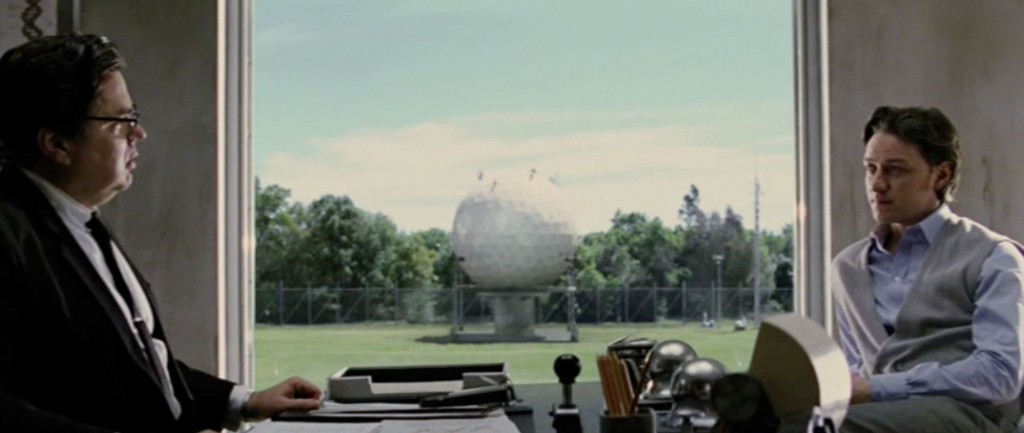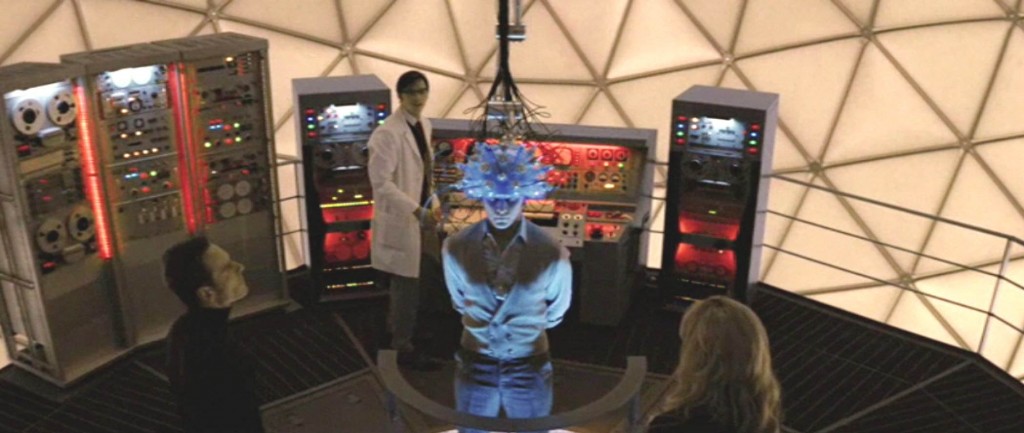X-Men: First Class part 6
While Shaw is at the North Pole in his submarine, preparing to destroy the world or something, Raven and Hank waste no time in getting to know each other. They bond over their shared desires to appear “normal.” The 1960s are still young, and the postwar conservativism that affected the US, despite the election of Kennedy in 1960, is still very much the order of the day. Perhaps the hippies of San Francisco would accept a boy with hands for feet or a scaly blue young woman, or perhaps they would be accepted at Harvard, where Timothy Leary was beginning his experiments with LSD. (Both Raven and Emma wear miniskirts even though they would not be invented until 1964. Mutants, as always, lead the way in evolution.)
Hank, we learn, has developed a serum that, he believes, will help a mutant maintain his or her abilities while making them appear “normal.” (How this is supposed to work, I have no idea — that’s right, I doubt the veracity of the science of X-Men.) Raven can’t wait to be jabbed by Hank’s needle, so to speak, but Erik comes along to pour cold water on their romantic-scientific tryst. Not only is Erik older and sexier than Hank, he’s prouder and more persuasive than Xavier. When he tells Raven “I wouldn’t change a thing,” it carries more weight than when Xavier says “Mutant and proud,” because Erik has been through the worst a mutant, an Other, can be put through, and come out the other side, while Xavier has never had to suffer a day in his life. Thus, he turns Raven’s head as her one-on-one with Hank suddenly becomes a triangle.
Erik, for his part, just wants to grab the CIA file on Shaw (which is left sitting around in someone’s office) and get back to his vengeful manhunt. Xavier holds him back, offers him something more than vengeance. He offers him, essentially, a family, which he lost to Shaw, and a community — a place at the table. That is, of course, the thing that Xavier’s position of privilege can offer the rage-filled loner Erik, although Erik is obviously loathe to accept Xavier’s charity. The basement-dweller can only see the garden, the attic-dweller can see the whole block. Erik and Xavier are both Other, but from different ends of the spectrum: Xavier defines himself by his expansiveness while Erik defines himself by his solitude. That bar of Nazi Gold, remember, that lump of metal, was “all that’s left of my people,” Erik said, not understanding that he might belong to another Other.
Speaking of Xavier’s expansiveness, we soon see that it not only knows no bounds, it seeks to expand the bounds it doesn’t have, as the MiB shows Xavier the prototype of Cerebro, a machine designed (by Hank, the Lucius Fox of the team) to help Charles expand his mind, literally, not just in the Timothy-Leary sense. Erik announces that he’ll help Xavier find Shaw his way (with lots of lingering close-ups between them) as long as it’s just mutants, no CIA agents doing the hunting. The MiB, with no alternative, agrees: the Other, only two strong, is already wresting control from the Establishment, and it’s only 1962.
But immediately, all is not well between Xavier and Erik. Erik resents Hank, not just because Hank is ashamed of his Otherness, but because Hank literally controls the machinery. Erik, of course, could easily dismantle Hank’s machinery with a flick of his wrist, but he’s now beholden (and falling in love with) Xavier. “You look like a lab rat,” he sneers to Xavier as Hank hooks him up to Cerebro (Hank explains to Xavier how the machine works, even though I would imagine it’s unnecessary to explain anything to Xavier). Erik, of course, has been a lab rat, and he resents the notion of Xavier, himself or any mutant working in the service of anyone, even the CIA, even in the service of capturing dangerous criminals and defusing an international crisis.




(Hank explains to Xavier how the machine works, even though I would imagine it’s unnecessary to explain anything to Xavier).
One thing I’m curious about with this series is whether it will show Xavier developing any ethics for when it’s okay to peek into and/or control people’s minds. So far, Mr. Privilege doesn’t see to have any concern for such things . . . .
Yeah, he doesn’t seem to “get” that “I know everything about you” isn’t the creepiest pick-up line ever.
It didn’t occur to me when I saw the movie, but now I’m wondering if the reason Xavier’s inclination is to offer the mutants he encounters a family is because the one thing he really lacked was a loving and supportive family. Mom was cold and distant and if Dad’s still around, I don’t believe he’s mentioned. Young Charles tries to give Raven the loving family that neither of them really have, tries to do the same thing for Erik, and will eventually become a father figure to much of the next generation of mutants.
Speaking of Mom Xavier (who probably has an established name in the comics, though I have no clue what it is), perhaps she was a less than loving parent precisely because Charles is a mutant. It’s got to be pretty awkward when your four year old is able to read your innermost thoughts.
Good points!
Xavier’s mother would have to be pretty distant indeed to go along with the whole “Guess what, I’ve got a new sister!” thing.
Or else he mind-controlled her into it. Both are disturbing, in different ways.
The more I think about Xavier the creepier he gets. Because yeah, he doesn’t have any compunction about reading anybody’s mind for any reason, or putting ideas into people’s head because it suits him.
Yeah, this is why telepaths without ethics are scary.
He’s a Godless brainwashing beatnik.
cerebro, spanish for brain — xavier’s only concession to heritage is hidden in a safespace accessible only to his mutant family (continuing my xavier/javier line of thought), and is a machine built for the sole purpose of finding more people like him. cut off from his culture, he seeks to assimilate into whiteness and to create a new culture of mutants at the same time. considering xavier and magneto are often posed as “martin vs. malcolm” (in a gross oversimplification of each of the two civil and human rights leaders), or integration vs. militant cultural preservation (in a gross oversimplification of each of the concepts), there’s a lot more to xavier’s assimilation than the surface details let on.
“mutant and proud” comes from “black and proud” by way of “out and proud”. “i’m black and i’m proud!” was famously chanted by one james brown in his song “say it loud (i’m black and i’m proud!)”, while shaking a head of conked hair. the hardest working man in showbusiness is not the origin of the phrase “black and proud”, but a definite landmark in the tradition of the use of the phrase by folks adopting assimilationist ideas. so, some further insight into the development of charles xavier, perhaps? not too certain — the story stick’s been passed around a lot, the tale convoluted, intended relations broken apart by stalwart editors (i.e. – wolverine as sabertooth’s son), and the whole thing’s a mess. but! it’s fun to think about, and it feels as though singer feels the same way, at least a little bit.
I’m not sure there’s a lot to be gained by leaning on the Spanish button. In the movie, Hank names the machine Cerebro, and while “cerebro” might be Spanish for brain, it’s derived from the Latin, which would be more Charles’s English education speaking than Spanish heritage.
yeah, i’d grant that. sometimes i forget to separate an adaptation from its source, and the source has a great many loose threads to tug at.